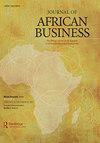股权结构、股利政策与财务绩效的因果关系:一个自举面板格兰杰非因果分析
IF 1.8
Q3 BUSINESS
引用次数: 0
摘要
摘要关于公司治理的各个维度(股权结构、股息政策)与财务绩效(股本回报率、资产回报率、托宾Q)之间的因果关系,实证结果喜忧参半。因此,本研究试图在一个新兴经济体,即突尼斯,对1996-2020年期间375个企业年的观察样本,检验这些主要指标之间的因果关系的存在和方向。本研究采用bootstrap面板Granger非因果关系检验,该检验考虑了横截面依赖性和斜率异质性问题。结果表明,所用变量对之间存在单向和双向显著因果关系。总体而言,在比较Kónya、Dumitrescu和Hurlin方法时,研究结果强调并证实了本研究中使用的所有变量之间因果关系方向的收敛性。本文章由计算机程序翻译,如有差异,请以英文原文为准。
Causal Nexus Between Ownership Structure, Dividend Policy and Financial Performance: A Bootstrap Panel Granger non-causality Analysis
ABSTRACT Regarding the causality nexus between the various dimensions of corporate governance (ownership structure, dividend policy) and financial performance (return on equity, return on assets, Tobin’s Q), the empirical results are mixed. Therefore, this study tries to examine the existence and the direction of causal relationship between these major indicators in an emerging economy, namely Tunisia for a sample of 375 firm-years observations during the period 1996–2020. This study applies a bootstrap panel Granger non-causality test which takes into account cross-sectional dependence and slope heterogeneity issues. Results show the existence of both unidirectional and bidirectional significant causal link between the pair of used variables. Overall, when comparing between Kónya and Dumitrescu and Hurlin approaches, the findings highlight and confirm the convergence of the direction of causality between all variables used in this study.
求助全文
通过发布文献求助,成功后即可免费获取论文全文。
去求助
来源期刊

Journal of African Business
BUSINESS-
CiteScore
4.60
自引率
10.50%
发文量
36
期刊介绍:
Journal of African Business is the official journal of the Academy of African Business and Development, the largest network of professionals committed to advancement of business development in African nations. JAB strives to comprehensively cover all business disciplines by publishing high quality analytical, conceptual, and empirical articles that demonstrate a substantial contribution to the broad domain of African business. Regardless of the research context, tradition, approach, or philosophy, manuscripts submitted to JAB must demonstrate that the topics investigated are important to the understanding of business practices and the advancement of business knowledge in or with Africa. Particularly, JAB welcomes qualitative and quantitative research papers. JAB is not, however, limited to African-based empirical studies. It searches for various contributions, including those based on countries outside Africa that address issues relevant to African business. Targeted toward academics, policymakers, consultants, and executives, JAB features the latest theoretical developments and cutting-edge research that challenge established beliefs and paradigms and offer alternative ways to cope with the endless change in the business world. Covered areas: Accounting; Agribusiness Management and Policy; Business Law; Economics and Development Policy; Entrepreneurship and Family Business; Finance; Global Business; Human Resource Management; Information and Communications Technology (ICT); Labor Relations; Marketing; Management Information Systems (MIS); Non-Profit Management; Operations and Supply Chain Management; Organizational Behavior and Theory; Organizational Development; Service Management; Small Business Management; Social Responsibility and Ethics; Strategic Management Policy; Technology and Innovation Management; Tourism and Hospitality Management; Transportation and Logistics
 求助内容:
求助内容: 应助结果提醒方式:
应助结果提醒方式:


